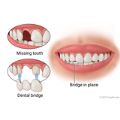Our Health Library information does not replace the advice of a doctor. Please be advised that this information is made available to assist our patients to learn more about their health. Our providers may not see and/or treat all topics found herein. Tooth decay is damage to a tooth caused by germs (bacteria) in your mouth. These bacteria make acids that can eat away at layers of the tooth. These include the hard outer layer (enamel), middle layer (dentin), and center of the tooth (pulp). The more layers that have decay, the worse the damage. Bacteria and food can cause tooth decay. A clear, sticky substance called plaque is always forming on your teeth and gums. Plaque contains bacteria that feed on the sugars in the food you eat. As the bacteria feed, they make acids. The acids attack the teeth for 20 minutes or more after you eat. Over time, these acids destroy tooth enamel and cause tooth decay. You may be more likely to have tooth decay if you: Children, whose teeth are still growing, are more likely to have tooth decay than adults. This is because the minerals in new teeth are not very strong and are easier for acids to eat away. You may not have symptoms until you have a cavity or tooth infection. When this happens, it's common to have a toothache. Your gums may swell near the sore tooth. You might have bad breath or a bad taste in your mouth. You could have white, gray, brown, or black spots on your teeth. Your dentist will ask about your past dental and medical problems and care. Your dentist will check your teeth using a pointed tool and a small mirror. You may also get X-rays of your teeth and mouth to find tooth decay that can't be seen with the eyes alone. Treatment for tooth decay depends on how bad it is. If tooth decay is caught early, before a cavity forms, you may be able to stop it by brushing with fluoride toothpaste or getting fluoride treatments. If the decay has eaten through the enamel, you may need one or more treatments. These may include: Current as of: September 30, 2025 Author: Ignite Healthwise, LLC Staff Current as of: September 30, 2025 Author: Ignite Healthwise, LLC Staff Clinical Review Board This information does not replace the advice of a doctor. Ignite Healthwise, LLC disclaims any warranty or liability for your use of this information. Your use of this information means that you agree to the Terms of Use and Privacy Policy. Learn how we develop our content. To learn more about Ignite Healthwise, LLC, visit webmdignite.com. © 2024-2025 Ignite Healthwise, LLC.Topic Contents
Tooth Decay
What is tooth decay?
What causes it?
What are the symptoms?
How is it diagnosed?
How is tooth decay treated?
How can you prevent it?
Related Information
Credits
Clinical Review Board
All Ignite Healthwise, LLC education is reviewed by a team that includes physicians, nurses, advanced practitioners, registered dieticians, and other healthcare professionals.
All Ignite Healthwise, LLC education is reviewed by a team that includes physicians, nurses, advanced practitioners, registered dieticians, and other healthcare professionals.
Our Health Library information does not replace the advice of a doctor. Please be advised that this information is made available to assist our patients to learn more about their health. Our providers may not see and/or treat all topics found herein. Current as of: September 30, 2025 Author: Ignite Healthwise, LLC Staff Clinical Review BoardTooth Decay
All Ignite Healthwise, LLC education is reviewed by a team that includes physicians, nurses, advanced practitioners, registered dieticians, and other healthcare professionals.





